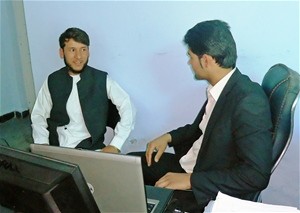
Citizens Legal Advocate Office lawyer consults with client.
USAID
New Citizens Legal Advocate Office (CLAO) in Kabul, supported by USAID, is resolving corruption complaints and putting government agencies on notice to exercise greater oversight
1 OCTOBER 2012 | KABUL, AFGHANISTAN
CHALLENGE Corrupt practices are strongly entrenched and widespread in Afghanistan, leaving substantial discretionary power to civil servants at all levels, making abuse of power and position commonplace, and reducing government’s legitimacy in the eyes of citizens. There are insufficient controls or enforcement to prevent or deter these corrupt practices that promote inequality and discourage foreign investment.
INITATIVE In January 2012, USAID’s awarded a competitive grant to the Afghanistan Independent Bar Association (AIBA) to establish a Citizens Legal Advocate Office (CLAO) in Kabul which offers free legal services to victims of corruption. The office is an independent entity where citizens and businesses can register their complaints with professional lawyers who provide legal advice, help bring a case to court or help resolve grievances administratively.
RESULTS When a small business taxpayer went to pay his annual tax of 7,000 Afs, the tax officer in the Income Directorate of the Tax Department demanded an extra 5000 Afs. When the taxpayer refused to pay, the officer told him that he would not receive an official receipt. The taxpayer believed that for him to complain to a government office would be a waste of time. As a result, the taxpayer just paid the 12,000 Afs and obtained the tax receipt. However, the receipt only showed a payment of 5,000 Afs. He felt cheated. Then he saw a CLAO poster and visited the office immediately, conveying his story to a lawyer. The lawyer accompanied the taxpayer to the tax office and demanded the money back. The tax officer claimed that he did not take any bribe. But the CLAO lawyer explained that unless he returned the money, he would refer the case to the Attorney General’s Office and, if convicted, the officer would not only have to return the money, but would go to prison and lose his job. The tax officer recanted, returned the bribe and promised not to take bribes in the future. In addition, the CLAO lawyer informed the tax officer’s supervisor about his client’s experience. The director promised to discipline the officer and ensure greater oversight over his department. The CLAO’s client was very happy to get his money back so quickly and to hear that corruption in the tax department would be curbed.







Comment
Make a general inquiry or suggest an improvement.